Description
What is Idebenone™?
Idebenone is a dietary substance that is a Nutritional Analog™ of an essential nutrient, coenzyme Q10 (CoQ10). CoQ10 is an important antioxidant component of the membranes that surround all body cells, as well as the membranes surrounding the various organelles (the “little organs” in our cells), such as mitochondria (which are the “power plants” of the cell). Idebenone is thought to enhance brain levels of serotonin and norepinephrine while stimulating Nerve Growth Factor (NGF – main factor in the nervous system responsible for nerve growth).
CoQ10’s pro-oxidant action.
When blood flow is seriously reduced to any part of the body, cellular O2 levels drop in the affected region, causing CoQ10 to produce damaging free radicals. Brain and spinal cord cells are especially prone to damage under these circumstances and may be irreparably damaged or even destroyed within minutes.
Idebenone’s potential nutrient benefits fall into five categories; antiaging, energy enhancement, cognition enhancement, organ protection and protector against excitatory amino acid neurotoxicity.
What are the Benefits of Idebenone?
The anti-aging benefits: Studies comparing heart tissue from young people with that from elderly people have shown almost no significant mitochondrial dysfunction in young hearts, with significant, often severe mitochondrial dysfunction in elderly hearts.
Idebenone can serve as a powerful mitochondrial free radical quencher, lessening the ever-increasing damage that occurs with age. This means much less degeneration of the entire body. Idebenone will work even better than CoQ10 to keep energy production high.
Energy enhancement: Studies have shown that Idebenone can tightly couple oxidation to energy production.
Cognition enhancement:
A variety of studies using brain cells, (animal and humans) have shown Idebenone’s ability to enhance brain structure and function. Keeping your Central Nervous System (CNS) clear of damaging free radicals!
Organ protector:
As our organs age or are damaged, we age and are damaged. Idebenone protects organs in many ways; it cushions them against hypoxic (low O2) and/or ischemic (poor blood flow) damage. Idebenone enhances normal ATP energy generation.
The free radical quencher: Idebenone is a powerful antioxidant, more so than CoQ10, and in some studies is 30 to 100 times more effective than vitamin E or vinpocetine as a free radical quencher within brain cells. Idebenone lessens the free radical induced mtDNA damage that accumulates exponentially over a lifetime, protecting from organ damage and aging.
Protection against excitatory amino acid (EAA) neurotoxicity: Glutamic acid and aspartic acid are the two chief EAA neurotransmitters in the human brain. Yet excessive amounts of EAA’s can accumulate in the fluid surrounding brain cells, causing damage and even death to nerve and glial cells through free radical mechanisms. Idebenone has shown dramatic protective effects against glutamate and other invasive toxicity.
Studies show that Idebenone enhances brain structure and function.
Discounts are available for package purchases.
Think clearer, remember more and feel better.
Suggested Serving: Start off with half a tablet (1/2) and increase up to two (2) tablets daily as a dietary supplement. Take with meals.
Notice:
Individual results may vary. You should always consult with your physician before starting this product or any health-related program. Galantamine is currently not recommended for use by young individuals.
Precautions:
If sensitivity or mild digestive upset occurs, reduce dosage or discontinue use. For adult use only. This product should not be used by those with moderate to severe depression. Do not use if tamper resistant seal is missing or broken. Consult your physician prior to use if you are pregnant or nursing.
KEEP OUT OF REACH OF CHILDREN
Our Supplements contain only the purest natural ingredients according to the highest standards. We use only the most natural fillers when needed. There is a difference and we have it! Read More.
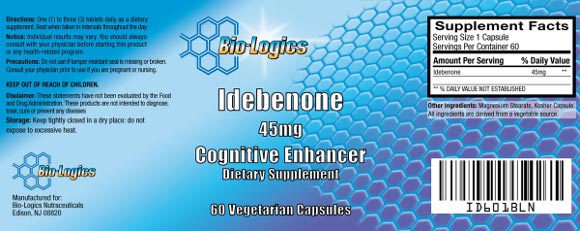
DISCLAIMER
THESE STATEMENTS HAVE NOT BEEN EVALUATED BY THE FOOD AND DRUG ADMINISTRATION. THESE PRODUCTS ARE NOT INTENDED TO DIAGNOSE, TREAT, CURE OR PREVENT ANY DISEASE. ALL INFORMATION FOR ALL PRODUCTS IS EDUCATIONAL ONLY AND IS TAKEN FROM VARIOUS THIRD PARTY SOURCES, AVAILABLE ON REQUEST. IT DOES NOT AND SHOULD NOT REPLACE THE ADVICE OF YOUR PHYSICIAN. THESE PRODUCTS ARE OFFERED AS DIETARY SUPPLEMENTS ONLY. WE DO NOT ENDORSE OR ADOPT THE INFORMATION AND CLAIMS CONTAINED IN THE THIRD PARTY SOURCES.
Links:
Journals
Hindmarch I, Coleston DM, Kerr JS.
Idebenone. A review of its pharmacodynamic and pharmacokinetic properties, and therapeutic use in age-related cognitive disorders.
Drugs Aging 1994 Aug;5(2):133-52
PMID: 7981485, UI: 95072342
1: Arzneimittelforschung 1998 Jul;48(7):720-6
Dose-effect relationship of idebenone in an experimental cerebral deficit model. Pilot study in healthy young volunteers with piracetam as reference drug.
Schaffler K, Hadler D, Stark M
Institute for Pharmacodynamic Research, Munich, Germany.
Matsuda T, Takuma K, Lee E, Baba A
[Cell injury and its protection in astrocytes].
Nippon Yakurigaku Zasshi 1999 Nov;114(5):281-6
PMID: 10621941, UI: 20087821
Rego AC, Santos MS, Oliveira CR
Influence of the antioxidants vitamin E and idebenone on retinal cell injury mediated by chemical ischemia, hypoglycemia, or oxidative stress.
Free Radic Biol Med 1999 Jun;26(11-12):1405-17
PMID: 10401604, UI: 99329847
Civenni G, Bezzi P, Trotti D, Volterra A, Racagni G
Inhibitory effect of the neuroprotective agent idebenone on arachidonic acid metabolism in astrocytes.
Eur J Pharmacol 1999 Apr 9;370(2):161-7
PMID: 10323265, UI: 99254844
Yamada K, Tanaka T, Han D, Senzaki K, Kameyama T, Nabeshima T
Protective effects of idebenone and alpha-tocopherol on beta-amyloid-(1-42)-induced learning and memory deficits in rats: implication of oxidative stress in beta-amyloid-induced neurotoxicity in vivo.
Eur J Neurosci 1999 Jan;11(1):83-90(7-9):487-90
PMID: 9987013, UI: 99141486
Hirai K, Hayako H, Kato K, Miyamoto M
Idebenone protects hippocampal neurons against amyloid beta-peptide-induced neurotoxicity in rat primary cultures.
Naunyn Schmiedebergs Arch Pharmacol 1998 Nov;358(5):582-5
PMID: 9840428, UI: 99054163
Schaffler K, Hadler D, Stark M
Dose-effect relationship of idebenone in an experimental cerebral deficit model. Pilot study in healthy young volunteers with piracetam as reference drug.
Arzneimittelforschung 1998 Jul;48(7):720-6
PMID: 9706371, UI: 98371660
Mordente A, Martorana GE, Minotti G, Giardina B
Antioxidant properties of 2,3-dimethoxy-5-methyl-6-(10-hydroxydecyl)-1,4-benzoquinone (idebenone).
Chem Res Toxicol 1998 Jan;11(1):54-63
PMID: 9477226, UI: 98136093
Nitta A, Murakami Y, Furukawa Y, Kawatsura W, Hayashi K, Yamada K, Hasegawa T, Nabeshima T
Oral administration of idebenone induces nerve growth factor in the brain and improves learning and memory in basal forebrain-lesioned rats.
Naunyn Schmiedebergs Arch Pharmacol 1994 Apr;349(4):401-7
PMID: 8058112, UI: 94335970
Funct Neurol 1994 May-Jun;9(3):161-8
Idebenone, a new drug in the treatment of cognitive impairment in patients with dementia of the Alzheimer type.
Bergamasco B, Scarzella L, La Commare P
III Neurological Clinic, University of Turin, Italy.
J Neural Transm Suppl 1998;54:301-10
Sustained efficacy and safety of idebenone in the treatment of Alzheimer’s disease: update on a 2-year double-blind multicentre study.
Gutzmann H, Hadler D
Krankenhaus Hellersdorf, o.B. Wilhelm-Griesinger-Krankenhaus, Abteilung fur Gerontopsychiatrie, Berlin, Federal Republic of Germany.
Life Sci 1994;55(25-26):2057-66
Interaction between psychological and pharmacological treatment in cognitive impairment.
Deberdt W
UCB Pharma, Chemin du Foriest, Braine-l’Alleud, Belgium.
Weyer G, Babeji-Dolle RM, Hadler D, Hofmann S, Herrmann WM, “A controlled study of 2 doses of idebenone in the treatment of Alzheimer’s disease ” Neuropsychobiology 1997; 36(2):73-82 http://content.karger.com/ProdukteDB/produkte.asp?Aktion=ShowAbstract&ArtikelNr=119366&Ausgabe=234959&ProduktNr=224082
Ranen NG and colleagues, “A controlled trial of idebenone in Huntington’s disease ” Mov Disord 1996 Sep; 11(5):549-554 http://www.ncbi.nlm.nih.gov/pubmed/8866496?ordinalpos=5&itool=EntrezSystem2.PEntrez.Pubmed.Pubmed_ResultsPanel.Pubmed_DefaultReportPanel.Pubmed_RVDocSum
Ikejiri Y, Mori E, Ishii K, Yasuda M, Sasaki M, “Idebenone improves cerebral mitochondrial oxidative metabolism in a patient with MELAS ” Neurology 1996; Aug 47(2); 583-585. http://www.ncbi.nlm.nih.gov/pubmed/8757046?ordinalpos=38&itool=EntrezSystem2.PEntrez.Pubmed.Pubmed_ResultsPanel.Pubmed_DefaultReportPanel.Pubmed_RVDocSum
Pisano P and colleagues, “Plasma concentrations and pharmacokinetics of idebenone and its metabolites following single and repeated doses in young patients with mitochondrial encephalomyopathy ” Eur J Pharmacol 1996; 51(2):167-169. http://www.ncbi.nlm.nih.gov/pubmed/8911883?ordinalpos=20&itool=EntrezSystem2.PEntrez.Pubmed.Pubmed_ResultsPanel.Pubmed_DefaultReportPanel.Pubmed_RVDocSum
Gillis JC, Benefield P, McTavish D, “Idebenone, a review of its pharmacodynamic and pharmacokinetic properties, and therapeutic use in age-related cognitive disorders.” Drugs Aging 1994; Aug;5 (2): 133-152. http://www.ncbi.nlm.nih.gov/pubmed/7981485?ordinalpos=13&itool=EntrezSystem2.PEntrez.Pubmed.Pubmed_ResultsPanel.Pubmed_DefaultReportPanel.Pubmed_RVDocSum
Nitta A, Hasegawa T, “Oral administration of idebenone, a stimulator of NGF synthesis recovers reduced NGF content in aged rat brain .” Neuosci Lett 1993 Dec 12; 163(2):219-222. http://www.ncbi.nlm.nih.gov/pubmed/8058112?ordinalpos=131&itool=EntrezSystem2.PEntrez.Pubmed.Pubmed_ResultsPanel.Pubmed_DefaultReportPanel.Pubmed_RVDocSum
Suno M, Nagaoka A, “Inhibition of brain mitochondrial swelling by idebenone.” Arch Gerontol Geriatr 1989 May; 8(3):299-305. http://www.ncbi.nlm.nih.gov/pubmed/2669658?ordinalpos=22&itool=EntrezSystem2.PEntrez.Pubmed.Pubmed_ResultsPanel.Pubmed_DefaultReportPanel.Pubmed_RVDocSum
Ihara Y, Namba S, Shiraba T, “Mitochondrial encephalomyopathy (MELAS), pathological study and successful therapy with coenzyme Q10 and idebenone.” J Neurol Sci 1989 May; 90(3):263-271. http://www.ncbi.nlm.nih.gov/pubmed/2738608?ordinalpos=46&itool=EntrezSystem2.PEntrez.Pubmed.Pubmed_ResultsPanel.Pubmed_DefaultReportPanel.Pubmed_RVDocSum
Lerman-Sagie T, Rustin P, Lev D, “Dramatic improvement in mitochondrial cardiomyopathy following treatment with idebenone.” J Inherit Metab Dis 2001 Feb;24(1):28-34. http://www.ncbi.nlm.nih.gov/pubmed/11286379?ordinalpos=30&itool=EntrezSystem2.PEntrez.Pubmed.Pubmed_ResultsPanel.Pubmed_DefaultReportPanel.Pubmed_RVDocSum
Gutzmann H, Hadler D., “Sustained efficacy and safety of idebenone in the treatment of Alzheimer’s disease: update on a 2-year double-blind multicentre study.” J Neural Transm Suppl 1998;54:301-10. http://www.ncbi.nlm.nih.gov/pubmed/9850939?ordinalpos=13&itool=EntrezSystem2.PEntrez.Pubmed.Pubmed_ResultsPanel.Pubmed_DefaultReportPanel.Pubmed_RVDocSum
Yamada K, Nitta A, Hasegawa T, “Orally active NGF synthesis stimulators: potential therapeutic agents in Alzheimer’s disease.” Behav Brain Res 1997 Feb;83(1-2):117-22. http://www.ncbi.nlm.nih.gov/pubmed/9062669?ordinalpos=56&itool=EntrezSystem2.PEntrez.Pubmed.Pubmed_ResultsPanel.Pubmed_DefaultReportPanel.Pubmed_RVDocSum
Bergamasco B, Scarzella L, “Idebenone, a new drug in the treatment of cognitive impairment in patients with dementia of the Alzheimer type.” Funct Neurol 1994 May-Jun;9(3):161-8. http://www.ncbi.nlm.nih.gov/pubmed/7988944?ordinalpos=5&itool=EntrezSystem2.PEntrez.Pubmed.Pubmed_ResultsPanel.Pubmed_DefaultReportPanel.Pubmed_RVDocSum

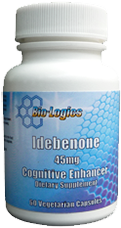
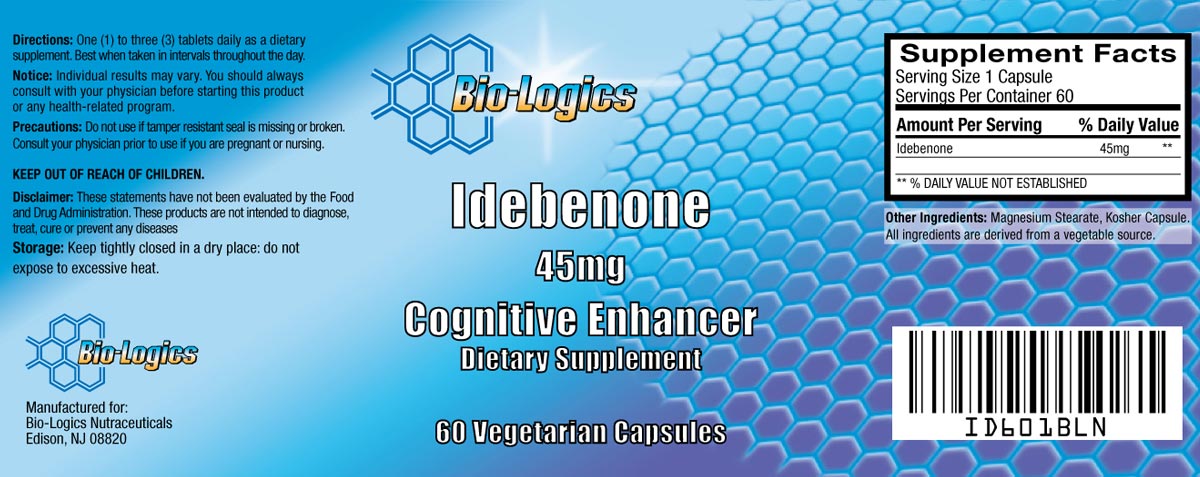

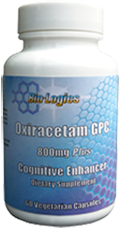
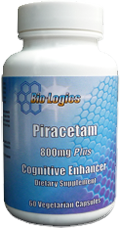
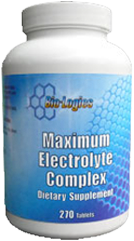
Reviews
There are no reviews yet.